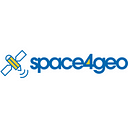1. Short description of GeoTech
The National Geospatial Technology Center of Excellence (GeoTech Center) is a collaborative effort of two-year colleges, universities, and industry with the vision of increasing the number and diversity of learners and workers with industry-defined geospatial technology (GST) skills and competencies.
The GeoTech Center, funded by the US National Science Foundation, has four integrated goals:
1) Research emerging trends and uses of GST;
2) Develop industry-aligned curriculum for new and incumbent users of GST;
3) Increase (and retain) the number of underrepresented populations (including veterans, women, minority groups, and persons with disabilities) into GST and STEM (Science, Technology, Engineering and Mathematics) fields;
4) Develop and implement professional development opportunities and resources for secondary and post-secondary faculty.
2. What are your current projects/initiatives linked to EO skills?
One of our initiatives is to work with our industry and governmental partners to identify the core competencies needed by workers in the geospatial industry. This aligns well with the EO4GEO project that is trying to do the same thing. We are also promoting the use of EO data such as remote sensing imagery (e.g. Sentinel 2 data) in our workshops. The GeoTech Center is also working with educators and industry professionals from around the country to create curriculum and concept modules that can be integrated into EO/GST courses.
3. How do you see EO skills evolving in the upcoming years?
We are committed to integrating Earth Observation data (e.g. multispectral and LiDAR data) from satellites, manned aircrafts, and unmanned aerial vehicles in our work. However, with the increasing volume of EO data that is being gathered from these platforms, there is a need to focus on skills such as data management and big data analytics more than ever.
4. Why was it important for you to join the EO4GEO project?
The GeoTech Center is undertaking initiatives that are similar to many of EO4GEO’s missions, focusing on determining the right skills to identify tomorrow’s workforce in the sector. One of our outcomes is the Geospatial Technology Competency Model (GTCM), which provides a tool to design an academic program, considering the skills needed by the workforce. We hope that this collaboration will give us an international perspective on the work we are already doing and facilitate the exchange of ideas as our organizations work toward the common goal of bridging the skills gap in the geospatial industry.
